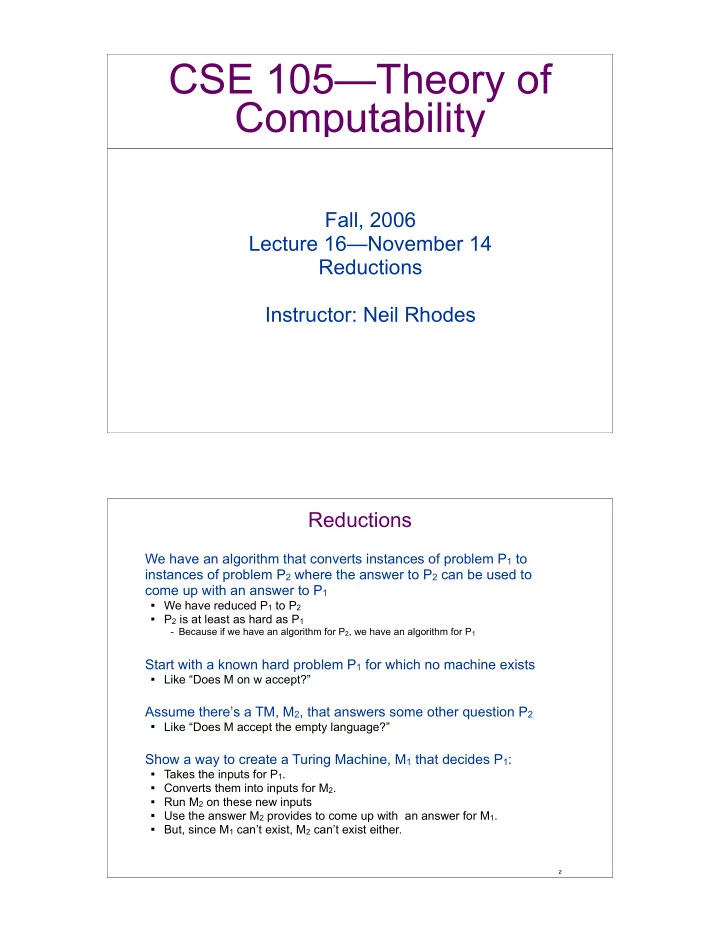

CSE 105—Theory of Computability Fall, 2006 Lecture 16—November 14 Reductions Instructor: Neil Rhodes Reductions We have an algorithm that converts instances of problem P 1 to instances of problem P 2 where the answer to P 2 can be used to come up with an answer to P 1 � We have reduced P 1 to P 2 � P 2 is at least as hard as P 1 – Because if we have an algorithm for P 2 , we have an algorithm for P 1 Start with a known hard problem P 1 for which no machine exists � Like “Does M on w accept?” Assume there’s a TM, M 2 , that answers some other question P 2 � Like “Does M accept the empty language?” Show a way to create a Turing Machine, M 1 that decides P 1 : � Takes the inputs for P 1 . � Converts them into inputs for M 2 . � Run M 2 on these new inputs � Use the answer M 2 provides to come up with an answer for M 1 . � But, since M 1 can’t exist, M 2 can’t exist either. 2
Reduction redux We reduce one language to another language � Not one machine to another machine When we reduce A to B: � We know we can’t decide A � We’re showing we can’t decide B When we reduce A to B � Assume we have a decider for B, M � Create a machine M’ that takes input for A � M’ gets to call the decider for B � M’ must decide A � Since A is undecidable, no decider for B can exist 3 Reducing A TM to halting problem Halting problem: � Given M on w, does M halt (accept or reject)? � HALT TM = {(M, w)| M is a TM and M halts on input w} Assume there exists machine M Halt that decides the halting problem Create M’ = “On input <M, w>, an encoding of TM M and string w: � Call M Halt on <M,w> – If rejects, reject – If accepts, simulate M on w and when it halts, accept or reject appropriately” M’ decides A TM ={<M, w>| M is a TM and M accepts input w} � But this is undecidable! � So, M Halt doesn’t exist � Therefore, Halting problem is undecidable 4
EMPTY TM ={<M> | M is a TM and M accepts the empty language} Is EMPTY TM decidable? Is EMPTY TMC recursively enumerable? 5 REGULAR TM ={<M> | M is a TM and M accepts a regular language} Is REGULAR TM decidable? 6
CF TM ={<M> | M is a TM and M accepts a context-free language} Is CF TM decidable? 7 EQ TM ={<M 1 , M 2 > | M 1 ,M 2 are TM and M 1 , M 2 accept the same language} Is EQ TM decidable? 8
Linear Bounded Automaton Turing machines that can’t read/write outside the input � A LBA = {<M, w>| M is an LBA such that M(w) accepts} � A LBA is decidable 9 Linear-Bounded Automaton E LBA is undecidable � If decidable, here’s algorithm for A TM 10
Does a CFG G generate all strings? ALL CFG ={G|G is a CFG and L(G)= � *} � Given M and w, construct G such that – G accepts all strings except accepting computation history for M on w 11
Recommend
More recommend